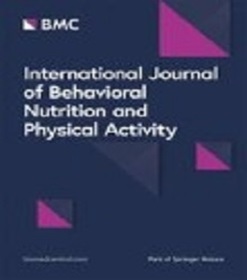Effects of combined dietary intervention and physical-cognitive exercise on cognitive function and cardiometabolic health of postmenopausal women with obesity: a randomized controlled trial
IF 5.5
1区 医学
Q1 NUTRITION & DIETETICS
International Journal of Behavioral Nutrition and Physical Activity
Pub Date : 2024-03-05
DOI:10.1186/s12966-024-01580-z
引用次数: 0
Abstract
Postmenopausal women with obesity are markedly at risk of cognitive impairment and several health issues. Emerging evidence demonstrated that both diet and exercise, particularly physical-cognitive exercise are involved in cognitive and health benefits. However, the comparative effect of diet, exercise, and combined interventions in postmenopausal women with obesity on cognition and cardiometabolic health is still lacking. Identifying the effective health promotion program and understanding changes in cardiometabolic health linking these interventions to cognition would have important medical implications. This RCT aimed to examine the effect of single and combined interventions of diet and exercise on cognitive function and cardiometabolic health in postmenopausal women with obesity. Ninety-two postmenopausal women with obesity were randomly assigned to diet group (intermittent fasting 2 days/week, 3 months), exercise group (physical-cognitive exercise 3 days/week, 3 months), combined group, or control group (n = 23/group). All cognitive outcomes and cardiometabolic outcomes were measured at baseline and post-3 months. Primary outcomes were executive functions, memory, and plasma BDNF levels. Secondary outcomes were global cognition, attention, language domain, plasma adiponectin levels, IL-6 levels, metabolic parameters, and physical function. At the end of the 3-month intervention, the exercise and combined group demonstrated significant memory improvement which was accompanied by significant improvements in plasma BDNF level, insulin levels, HOMA-IR, %body fat, and muscle strength when compared to controls (p < 0.05). Only the combined intervention group demonstrated a significant improvement in executive function and increased plasma adiponectin levels when compared to control (p < 0.05). Surprisingly, no cognitive improvement was observed in the diet group (p > 0.05). Significant reduction in cholesterol levels was shown in the diet and combined groups when compared to controls (p < 0.05). Among the three intervention groups, there were no significant differences in all cognitive outcomes and cardiometabolic outcomes (p > 0.05). However, all three intervention groups showed significant improvements in plasma BDNF levels, weight, BMI, WHR, fat mass, and predicted VO2 max, when compared to control (p < 0.05). These findings suggest that combined physical-cognitive exercise and dietary intervention are promising interventions to improve cognition and obesity-related complications of postmenopausal women with obesity. NCT04768725 ( https://clinicaltrials.gov ) 24th February 2021.饮食干预和体育认知锻炼对绝经后肥胖妇女认知功能和心脏代谢健康的影响:随机对照试验
绝经后肥胖妇女有明显的认知障碍和多种健康问题的风险。新出现的证据表明,饮食和运动,尤其是身体认知运动,对认知和健康都有益处。然而,对于绝经后肥胖妇女来说,饮食、运动和综合干预措施对认知和心脏代谢健康的影响还缺乏比较。确定有效的健康促进计划并了解这些干预措施与认知相关的心脏代谢健康变化将具有重要的医学意义。这项研究旨在探讨饮食和运动的单一干预措施和综合干预措施对绝经后肥胖妇女的认知功能和心脏代谢健康的影响。92名绝经后肥胖妇女被随机分配到饮食组(间歇性禁食,2天/周,3个月)、运动组(体育认知运动,3天/周,3个月)、联合组或对照组(n = 23/组)。所有认知结果和心脏代谢结果均在基线和3个月后进行测量。主要结果为执行功能、记忆力和血浆 BDNF 水平。次要结果包括整体认知、注意力、语言领域、血浆脂肪连接蛋白水平、IL-6 水平、代谢参数和身体功能。在为期 3 个月的干预结束时,与对照组相比,运动组和联合组的记忆力明显改善,同时血浆 BDNF 水平、胰岛素水平、HOMA-IR、体脂百分比和肌肉力量也有显著改善(P 0.05)。与对照组相比,饮食组和综合组的胆固醇水平明显降低(P 0.05)。然而,与对照组相比,所有三个干预组的血浆 BDNF 水平、体重、体重指数、WHR、脂肪量和最大预测 VO2 均有显著改善(P < 0.05)。这些研究结果表明,体育认知锻炼和饮食干预相结合是一种很有前景的干预方法,可改善绝经后肥胖妇女的认知能力和肥胖相关并发症。NCT04768725 ( https://clinicaltrials.gov ) 2021年2月24日。
本文章由计算机程序翻译,如有差异,请以英文原文为准。
求助全文
约1分钟内获得全文
求助全文
来源期刊
CiteScore
13.80
自引率
3.40%
发文量
138
审稿时长
4-8 weeks
期刊介绍:
International Journal of Behavioral Nutrition and Physical Activity (IJBNPA) is an open access, peer-reviewed journal offering high quality articles, rapid publication and wide diffusion in the public domain.
IJBNPA is devoted to furthering the understanding of the behavioral aspects of diet and physical activity and is unique in its inclusion of multiple levels of analysis, including populations, groups and individuals and its inclusion of epidemiology, and behavioral, theoretical and measurement research areas.

 求助内容:
求助内容: 应助结果提醒方式:
应助结果提醒方式:


